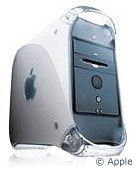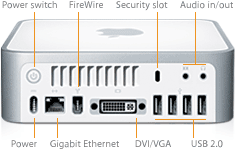When I purchased my first LCD TV back in 2006, I immediately began
thinking of the possibilities of connecting a computer to its VGA port
and being able to watch what I wanted when I wanted.
The first machine I attempted this with was my old 2.26 GHz Pentium
4 Dell running Windows XP Media Center edition. Everything worked well
until I had a need for a computer capable of running Solaris, so the
ugly old Dell was replaced by a prettier, yet underpowered, Power Mac G4 Dual 450 MHz
tower.
 At this time,
I had no surround sound setup (having given away my value-minded Sony
home theater a year earlier) and a terrible ViewSonic 32" LCD.
At this time,
I had no surround sound setup (having given away my value-minded Sony
home theater a year earlier) and a terrible ViewSonic 32" LCD.
The Power Mac could handle standard definition (SD) video fairly
well, but any movie file demanding more from its limited CPU and paltry
RAM would cause the system to slow to a crawl.
The ViewSonic bit the dust after just 13 months. With no support
from the company at all, I purchased a replacement TV. At a mere $700,
I bought a 32" Sharp Aquos 720p set and was very satisfied, especially
with its inclusion of a DVI port,
along with an extra HDMI port to boot.
A few months later, I decided it was time to replace the Power Mac
with something with a bit more power and smaller footprint. I
considered building a cheap home theater PC (HTPC), based on Windows,
but I hated the way the enclosures looked, not to mention having to use
Windows or Linux.
 My logical course of action
was to buy an Intel Mac
mini.
My logical course of action
was to buy an Intel Mac
mini.
My 1.66 GHz Core Duo Mini came in the mail around mid April of 2007.
As any other Mac-head would probably have done, I took it apart
immediately, swapping out its limited 512 MB DDR2 SDRAM with 2 GB,
and replacing its 60 GB hard drive for a 160 GB Seagate drive I took
out of an external enclosure.
Needless to say, the Mini isn't the easiest thing to take apart, and
in the end the wireless connector wouldn't connect back in. All in all,
the hassle was worth it. Maxing out the mini right away proved to be
well worth the time, avoiding having to do this too often in the
future.
As anyone with an Intel Mac knows, high definition (HD) video is
super smooth on these machines. Even the lowest Core-based CPU can
render video much quicker, and in a much smoother fashion than an old
G4. The lesson here is that a mini is a near perfect HTPC.
Fast forwarding to today, my home theater is almost where I'd like
it to be. The Sharp has been replaced by a 1080p, 120 Hz, Sony Bravia
40z4100 (Silver) with mind blowing picture quality and price tag. But
video isn't the only part of a good home theater; sound is also
crucial.
I knew I wanted the best sound quality, with elegant, low profile
equipment without breaking the bank. Although my heart was set on a
Bang and Olufsen speaker system, still being in college at the time,
this was by no means viable.
Bose was my backup.
I picked up 3 Bose Cube speakers off of
eBay (only one year old) for $230, and stole the other two and the
Accustimass Subwoofer from my father's stereo setup (he hadn't used
them in years, so he wouldn't miss them). Next I needed a good yet
sleek receiver to plug all this into. My choice was a Harman Kardon 5.1
surround sound who's model number escapes me. Its simple design and
sophisticated audio output fit my needs perfectly.
Blu-ray is the new big thing when it comes to HD movies (other than
downloadable content). The logical choice was to sell my lackluster
Xbox 360 for one of Sony's PS3 systems. Paired to an optional Bluetooth
remote, it becomes the quintessential Blu-ray player.
Connecting all this to the home theater is a matter of preference.
At first I used a dual RCA-to-Mini-Line-in cable to connect the Mac to
the sound source. This works well enough if you don't want surround
sound or digital audio. But for audiophiles such as myself, this was
just a temporary solution. I picked up an M-Audio Transit USB sound
card off of Amazon.com
for a respectable $78. This device allows you to connect a mini to any
audio source using an optical cable, and also allows for 24-bit/96 kHz
upconverting of audio. The difference, especially while listening to
music, is astounding.
On the software side, all you really need to turn a mini into a
glorified Apple TV is iTunes and VLC Media Player. With these two
programs you'll be able to purchase any TV show or movie you want, as
well as rip any other videos you want.
I would also recommend an external FireWire hard drive. I chose a
LaCie 500 GB drive with a proprietary RAID array to keep all my video,
audio, and picture files on a portable medium, in case something were
to happen to my OS X installation.
There you have it: although I went all out, turning your Mac mini
into a home theater PC is really as simple as plugging it into your
HDTV and turning it on. 

 At this time,
I had no surround sound setup (having given away my value-minded Sony
home theater a year earlier) and a terrible ViewSonic 32" LCD.
At this time,
I had no surround sound setup (having given away my value-minded Sony
home theater a year earlier) and a terrible ViewSonic 32" LCD. My logical course of action
was to buy an Intel
My logical course of action
was to buy an Intel 
